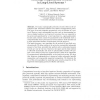Free Online Productivity Tools
i2Speak
i2Symbol
i2OCR
iTex2Img
iWeb2Print
iWeb2Shot
i2Type
iPdf2Split
iPdf2Merge
i2Bopomofo
i2Arabic
i2Style
i2Image
i2PDF
iLatex2Rtf
Sci2ools
105
click to vote
CONCUR
2008
Springer
2008
Springer
Modeling Computational Security in Long-Lived Systems
Abstract. For many cryptographic protocols, security relies on the assumption that adversarial entities have limited computational power. This type of security degrades progressively over the lifetime of a protocol. However, some cryptographic services, such as timestamping services or digital archives, are long-lived in nature; they are expected to be secure and operational for a very long time (i.e., super-polynomial). In such cases, security cannot be guaranteed in the traditional sense: a computationally secure protocol may become insecure if the attacker has a super-polynomial number of interactions with the protocol. This paper proposes a new paradigm for the analysis of long-lived security protocols. We allow entities to be active for a potentially unbounded amount of real time, provided they perform only a polynomial amount of work per unit of real time. Moreover, the space used by these entities is allocated dynamically and must be polynomially bounded. We propose a new notion...
CONCUR 2008 | Distributed And Parallel Computing | Long-lived Security Protocols | Long-lived Timestamping Protocol | Security |
Related Content
| Added | 18 Oct 2010 |
| Updated | 18 Oct 2010 |
| Type | Conference |
| Year | 2008 |
| Where | CONCUR |
| Authors | Ran Canetti, Ling Cheung, Dilsun Kirli Kaynar, Nancy A. Lynch, Olivier Pereira |
Comments (0)

